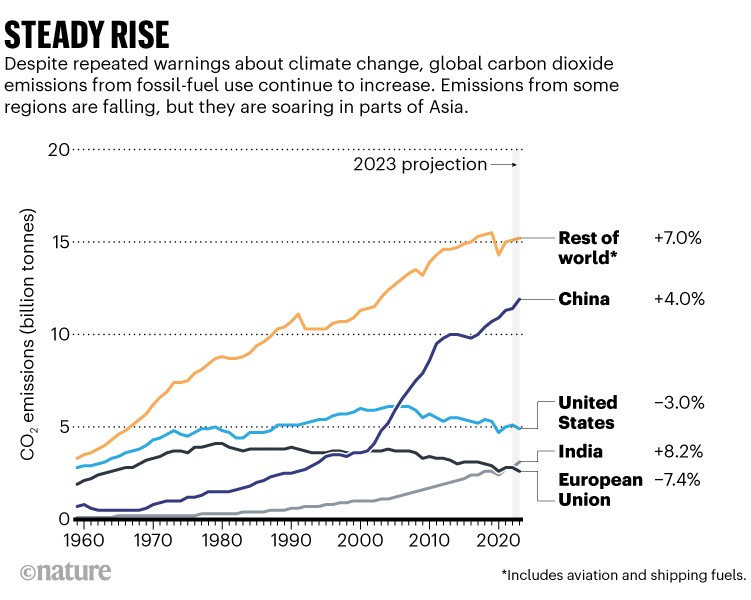
Climate change has placed the world in danger of breaching numerous planetary “tipping points”, according to a scientific assessment compiled by more than 200 researchers. Crossing those points could lead to irreversible effects on natural systems that are crucial to human livelihoods, write the authors, who add that it’s time to confront these dangers head-on — and accelerate efforts to prevent them.
Some scientists remain wary of over-emphasizing tipping points, because it’s difficult to define the risks and assess their likelihood. But few doubt that the risks are real, or that they are increasing as global temperatures escalate.
“These tipping points pose threats of a magnitude that has never been faced before by humanity,” says Tim Lenton, a climate scientist at the University of Exeter, UK, who led the report with support from the Bezos Earth Fund, a philanthropic organization based in Washington DC and set up by Amazon founder Jeff Bezos.
The report was released today at the 28th United Nations Climate Change Conference (COP28) in Dubai, United Arab Emirates, as government officials conduct their first formal appraisal of progress under the landmark 2015 Paris agreement to curtail climate change.
Emissions on the rise
Other data released at COP28 make clear the extent of the challenge. Scientists announced on 5 December that this year’s global fossil-fuel emissions are on track to hit a record high of roughly 37 billion tonnes of carbon dioxide — 1.1% more than in 2022 (see ‘Steady rise’) . And Climate Action Tracker, a scientific consortium that monitors climate policies, estimated that nations’ current pledges to cut emissions, as required by the Paris agreement, could still allow global temperatures to climb to 2.5 °C above pre-industrial levels by 2100.

Source: Global Carbon Project
The tipping-points report paints a picture of what could happen as a result. It assesses evidence regarding the potential causes and likelihood of 26 climate tipping points: thresholds that, if crossed, would result in potentially irreversible change to Earth’s system.
The most immediate danger is to coral reefs around the globe, which are threatened even at present levels of warming. The ice sheets in Greenland and West Antarctica are also at risk of irreversible collapse that could boost sea levels this century and beyond.
With just 1.5 °C of warming above pre-industrial levels, northern forests are at risk, as are mangroves and other coastal ecosystems, the report warns. Large parts of the Amazon rainforest could be replaced by savannah with as little as 2 °C of warming, disrupting life across South America and resulting in even more carbon being pumped into the atmosphere.
Action needed now
Consideration of tipping points makes short-term action even more urgent, says Manjana Milkoreit, a political scientist at the University of Oslo and co-author of the report. The Intergovernmental Panel on Climate Change has assessed various scenarios that aim to achieve the 1.5 °C goal, but almost all allow temperatures to overshoot that level temporarily before dropping again as humans remove CO2 from the atmosphere later this century. Such overshoot scenarios increase the risk of breaching tipping points, which would make it impossible to restore the climate to its current state.
This means that humanity’s decisions over the next decade or two could affect life on the planet for thousands of years, says Milkoreit. “The governance systems we have today are not well suited to a problem of that nature.”
Messaging question
For some researchers, however, the question is whether focusing on tipping points makes a difference from a social and political standpoint. “I’m sceptical,” says Michael Oppenheimer, a climate scientist at Princeton University in New Jersey.
Oppenheimer suspects that the increasing frequency of extreme weather events and other climate impacts is more likely to change minds and stimulate action than are warnings of potential climate catastrophes. Moreover, if governments took sufficient action to protect their citizens from well-known climate impacts, he says, “they wouldn’t have to worry about tipping points”.
The report also provides hope. It lists potential positive tipping points in social, political and economic systems, which, if crossed, could result in runaway benefits for the climate. Scientists say they are already seeing evidence of one such tipping point as declines in the cost of wind and solar power drive more and more investments away from fossil fuels and towards clean energy.
What’s clear is that the kinds of incremental policy that governments have pursued so far aren’t enough, Lenton says. “We need to find and trigger some positive tipping points that accelerate action down an alternative pathway.”
Source link




